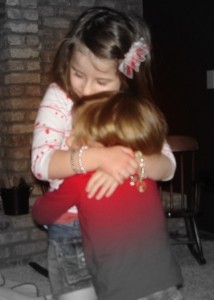Minnesota Mamaleh: I Love Valentine’s Day!
But alas, I already wish that I got a bit more sleep so we don’t celebrate everything. We do, however celebrate all Jewish holidays and all American holidays, too. And that includes Valentine’s Day.
I love the hearts. The red and pink clothes, hair ribbons, food, everything really. The cookies, the chocolates, the cards. I love it all. And we do it all. Imagine my surprise when Kayli started preschool at a fabulous Jewish school and they didn’t *gulp* celebrate Valentine’s Day. Class lists were not sent home, class time was not set aside for valentine deliveries and Valentine’s Day was not on the theme list.
It was just so sad! Don’t get me wrong, we sent valentines in anyway. I just helped Kayli deliver them myself.
Rereading that, I realize what a blatant disregard for the rules that was and I’m not 100% sure what kind of a message that sent to Kayli. Or Jason, who pretty much stays out of the way when I get into holiday mode. Smart, smart man.
But, really people? What exactly is the purpose of not celebrating American holidays? What message are we trying to send when we “opt out” of lovely card giving, friend appreciating, chocolate indulging holidays?
I went to grad school in California where we thought A LOT about questions such as these. My program was called “The Academy” and we focused on authentic learning. We researched our students’ backgrounds and used this information to help guide our curriculum because kids are motivated to learn new things when the lesson starts with something known and familiar.
We were actually kind of a pain in the tuchus. The heads of our program told us that many of the other professors chose to not teach Academy sections because we asked too many questions and over-analyzed everything. Those of you who know me well can refrain from stating what a perfect match that sounds like. Thanks!
We student taught in Academy alumni classrooms where we observed student-run, diplomatic class meetings, dialogue defined and used and authentic holiday celebrations. As in really authentic.
For example, on Halloween students didn’t just dress up and carve pumpkins.
Although they did do that, too. Because it’s fun. They also learned about Dia de Los Muertos. Because it’s authentic. Costumes and pictures honoring deceased loved ones went together surprisingly well and a whole lot of learning happened. Win-win.
So when I had my first little group of Kindergartners, I too had class meetings, dialogue and authentic holidays. After Dia de los Muertos was such a success, I was raring to go when Valentine’s Day rolled around.
As I researched the origins of Valentine’s Day I learned a lot about saints and conflicting histories. While the stories gave me pause, for sure, they didn’t deter me from teaching Valentine’s Day in all its glory to my students.
And I feel the same way about teaching and celebrating Valentine’s Day with my own kids. They’ve been taught that a long, long, long time ago there was a connection to a Saint Valentine. And today, not so much.
And really, what’s the harm in setting a day aside for love? So what if it’s been Hallmark-ized. You, my dear friends, have control over how you celebrate holidays and you need not step into a Hallmark store if you’re really opposed to it. Just spend the day loving and adoring family and friends. Yet another win-win.
In reflecting upon some of the lovely friends that Kayli and Chloe have made at their Jewish preschool over the years, I realized that a staggering number of them are actually not Jewish. Their parents chose a Jewish school because of it’s location, amazing teachers and stellar curriculum. And while Jason and I agree whole-heartedly with all of these qualities, we really just go there because we want our kids to go somewhere Jewish.
I was struck by how very open-minded these families were in this decision; knowing full well that their kids would be learning about holidays and celebrations that are very different from their own family’s beliefs.
It would never occur to me to send my own kids to a Christian school. As in, I drive way out of my way several times a week through absolutely horrid weather to avoid just such a situation.
Some of our new non-Jewish preschool friends, however, cheer for their kids at Hanukkah programs, buy challah on Fridays and learn the words to Boker Tov willingly and happily.
Perhaps we can all take a lesson or two from these families. If something, such as Valentine’s Day, is good for kids (as I believe holidays, celebrations, days set aside to be different, special and fun are), perhaps that is more important than the fact that it is different or non-traditional to us.
With that, I wish you the happiest of Valentine’s Days! You have just enough
time to pull together some tokens of affection for people from all different parts of your life. Don’t hesitate, just send that Hallmark card already. And feel free to add some chocolate to it as well!









When I see Jewish families (from the liberal Jewish community) putting a tremendous amount of effort into celebrating Halloween and Valentine’s Day, I wonder how their lives would be enhanced if they put just as much effort into Sukkot, Purim, and Shavu’ot. It saddens me that two of our three major festivals receive scant attention in the home celebrations of most of our families. Yet these same families invest a great deal of thought, time, and money into secular holidays.
Hi Rivster! Thanks for the note. I agree with you completely– family life is enhanced by celebrations. We celebrate Jewish and American holidays because they are both part of who we are. I guess you could say that we employ a “no holiday left behind” kind of theory!
Will you help me understand the why behind *not* celebrating American holidays? Not in lieu of Jewish holidays, but as a nice addition to (of course!). This has always perplexed me!
And as a side note, at our house there’s lots of effort put into holidays, for sure, but not necessarily the lots of money. Why thank you Target $1 section! 🙂
Rivster,
When you see Jewish families celebrating Halloween and Valentine’s day, why would you automatically assume that they are not celebrating equally Sukkot, Purim, and Shavu’ot? I guess I don’t see why they would be mutually exclusive. Would you advocate that one pick either 4th of July or Yom Ha’atzmaut?
True, Halloween and Valentine’s are highly commercialized and, therefore, much easier to shop for (hence the fact that people are more likely to sink a disproportionate amount of $$ into them), but what Galit is driving at – and you elude to – is that holidays and their associated celebrations provide enrichment and enhancement to our lives.
Homestly? We celebrate Thanksgiving, we go see fireworks on the 4th, etc, but this one is a stretch for me to think of as genuinely an American holiday. I also don’t really think of it as a kid holiday, but one about romantic love. If you need an excuse to go out for a romantic date, b’vakasha, (believe me, we could!) but I must admit to finding it quite burdensome to receive a list of preschoolers this that my daughter is expected to bring in valentines for. I don’t see how buying or finding time to make cards (when, or when are we going to make 20 cards?) in anyway speaks to how much she loves some of her classmates and frankly doesn’t care for some of them. We’ll be making mishloach manot in a few weeks, and that seems way more kid-appropriate.
Danny, hi! Thanks for your comment. I agree 100%– holidays are at the core of family traditions and memories.
& Amy, fun to hear from you, too! I guess when I said American holiday, I meant one that (most) Americans celebrate rather than a “Woo Hoo America” holiday.
I agree with you that Valentine’s Day’s main idea is around romantic love and isn’t “aimed at” kids in that way. One could say the same thing about Thanksgiving, though. We celebrate all holidays with our kids, as a family, to build our own traditions and to model and teach our beliefs. In this case, about love and friendship. I remember reading an old post of yours about going on a family date to celebrate Tu B’Av; that’s totally the kind of thing that we would do.
In my experience, it’s just as time consuming to make mishloach manot as it is to make or address valentine cards. We’ll be doing that, too. And just like valentines, the effort will be well worth it because it’s kind, it’ll make the recipients feel good and teach my kids about doing something kind for classmates (even the ones that they don’t care for!).
As much as it saddens me to think of our family doing things so differently from some families that I admire and respect so much, I will admit that this is exactly the conversation that I wanted to have.
Is there a reason behind not celebrating Valentine’s Day or is it just a personal choice?
I love this topic; thanks! I started to reply here and then realized I had not one but FIVE reasons why I choose not to celebrate Valentine’s Day or involve my kids in it. Rather than put you all to sleep, I thought I’d just provide a link rather than my actual thoughts!
http://ronypony.blogspot.com/2010/02/who-doesnt-love-valentines-day.html
I’d love to hear from others, either way!
Galit, since you’ve asked twice, I’ll volunteer to be your foil in the argument over whether to celebrate all American holidays.
I take this up not so much from personal conviction (my own views are not 100% settled) as from an inability to pass by an interesting debate.
To me, the reason that most readily comes to mind is simple to state — to be different.
Simple to state, but hard to explain.
First, let me state my assumptions; these may not be shared by all.
Assumption 1: As Jews in the diaspora, we are under a certain amount of pressure. Pressure to assimilate, to not stick out so much. (There is much to say on this, and it’s hard to know how much of that to put in this post.) At least in the US, this is not unfriendly pressure. It’s not even done consciously. It may not even be “done” by any particular person. But the fact remains, that, being just 2% of the population, if we don’t focus on preserving our differences, we will lose them.
Assumption 2: For Jews, it’s good to be different. We want to preserve our heritage.
Assumption 3: For Jews in the diaspora, it’s not good to be (seen as) too different. (Evidence? History of European Jewry. ‘Nuff said.)
So, to me, there are reasons for a diaspora Jew to be a little picky about following all the customs of the gentiles. Maybe we shouldn’t do each thing that gentiles do for no better reason that they do it. That is, maybe we should examine a custom to see whether we’re comfortable, as Jews, following it. To me that means being hyper-vigilant about Christian influences. I want to think hard before I end up doing something Christian, even if most Christians somehow don’t see it as such.
So, for me, Christmas, and anything having to do with it — out. Saint Valentine’s day? It’s a hard one to avoid. I bow to local tradition when it comes to my girlfriend, but I couldn’t defend my actions. And I would think thrice before having my children do it.
For me, ultimately, it’s all about children. (I have no children yet; I realize that, speaking to parents about children, I risk sounding uninformed, at best. Oh well. Maybe clarity could substitute for information.) Children are the ones in danger of assimilating too much. Given current intermarriage rates, I worry about not having Jewish grandchildren. I see a young person saying to him-/herself: “Why do I have to limit myself to only Jews? What about this blond Swede? My family celebrates everything that her/his family celebrates, and we celebrate our holidays; we could do that together — why not?” In an America where we celebrate _all_ American holidays, it’s that much harder to tell that young person why not.
Hi Jennifer! Thanks for the comment and for the link. I really enjoyed your post. It was thrilling and thoughtful as promised. I did have to smile a bit at your love for St Patrick’s Day!
And Mike, so good to hear from you! I really liked what you wrote so very much. My husband and I have often talked about the seeming image of “trying to be different” and you really described and explained it well.
Here’s my thoughts…one thing that I am *not* afraid of is my kids growing up and not being Jewish. I only have two reasons for this (hard to believe, but true).
The first is the pure joy I see in my kids as we do holidays together. Jason and I work so very hard to make sure they’re learning, connecting, doing, questioning. Judaism is a part of who we are. Challah was within all of our kids’ first 10 words. “Mo’ ‘Lah” is how it usually went.
And the second is that as much as I wish it weren’t so, I know that I can’t actually control the outcome here. Jason and I are showing our kids what we believe and how we do things but ultimately those decisions are theirs and I wouldn’t have it any other way. We’re building memories and traditions, because *that* we can control.
I hope I didn’t make it sound as if I don’t expect my daughter to be nice, or do nice things for everyone in her class…..I just don’t think it’s necessary for her to write them love notes.
And for the record, I don’t think it’s *wrong* to celebrate Valentine’s Day, it just flat out doesn’t speak to me as a childrens/family holiday. It probably has more to do with the fact that my own family didn’t celebrate it than anything else.
I don’t agree with the Thanksgiving analogy – I think the “main idea” of Thanksgiving is for all ages. It’s some of the truths about the history of our country that might not be so appropriate….
I really like what Mike had to say. I think that being different does a lot to preserve who we are as a people distinct from other peoples.
I am certainly not advocating an avoidance of American chagim. Thanksgiving, Independance Day, etc. are important historical celebrations and bind us to the history of this country. St. Valentine’s Day and Halloween?? Not on the same leval.
I do not automatically assume that families who observe Halloween, etc. are not observing our Festivals. My comment was directed to those I KNOW are not observing our Festivals but ARE pouring a tremendous amount of energy into these other celebrations.
I think Valentine’s Day is definitely worth celebrating. And just think, now you’re the rebel mom.
You’re like James Dean of elementary school.